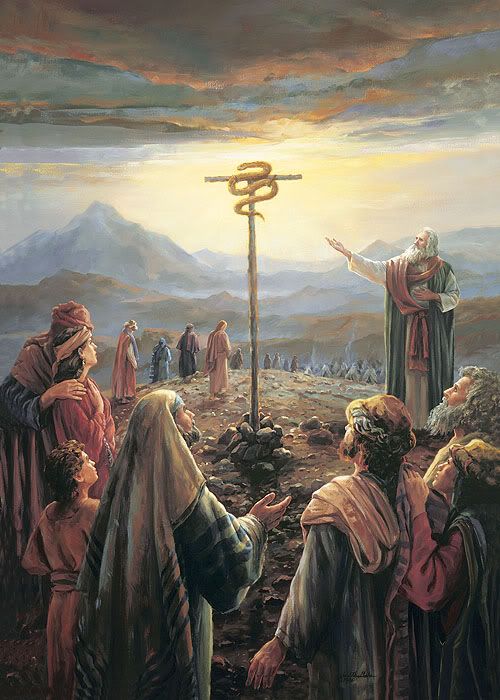To accompany your Come Follow Me study for May 9-15
In addition to reading the indicated chapters, you may wish to:
- Read the applicable portions of the Old Testament Institute Student Manual at https://www.churchofjesuschrist.org/study/manual/old-testament-student-manual-genesis-2-samuel/numbers-1-12-wilderness-wanderings-part-1?lang=eng and https://www.churchofjesuschrist.org/study/manual/old-testament-student-manual-genesis-2-samuel/numbers-13-36-wilderness-wanderings-part-2?lang=eng
- See any or all of the following animated videos dealing with this week’s material:
- Come Follow Me 2022 LDS (May 9-15) Numbers | The Talking Donkey at https://www.youtube.com/watch?v=X4iTU24LLEc
- The Book of Numbers at https://www.youtube.com/watch?v=zebxH-5o-SQ
- Israel Refuses to Enter the Land at https://www.youtube.com/watch?v=nx6gQdKQDZM
- Numbers 20:1-13 Water from the Rock at https://www.youtube.com/watch?v=uAhffeeRme0
- Salvation from Poisonous Snakes at https://www.youtube.com/watch?v=UrRKZuYkE-w
- The Bronze Snake at https://www.youtube.com/watch?v=JndLaj3fQyw
- Balaam and the Talking Donkey at https://www.youtube.com/watch?v=KM2S2O0w3S0
If you would like a Kahoot game related to this material which you could use for personal study or use with your family or your class, click here: https://create.kahoot.it/share/numbers-11-14-20-24/ab9f4cee-0788-4294-84a5-4cbbf88d6f87
Points to Ponder in Numbers 11-14, 20-24
1. What do you feel are the most important principles that are taught in Numbers 11?
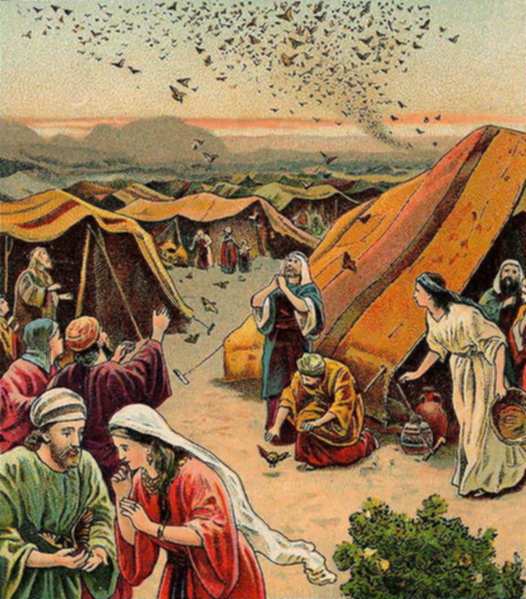
2. Who was right in the expressed difference of opinion between Moses and Joshua in 11:27-29? Weren’t both men prophets? How, then, could they disagree?
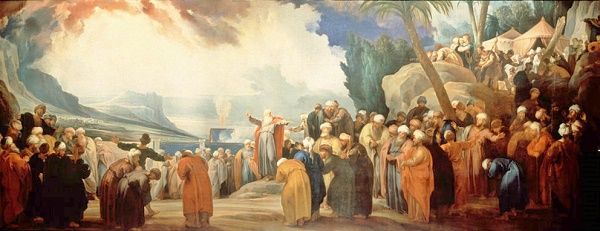
3. When the people complained so much about their diet, why did the Lord send such an overabundance of quail that even those who gathered the least had some 65 bushels of them?

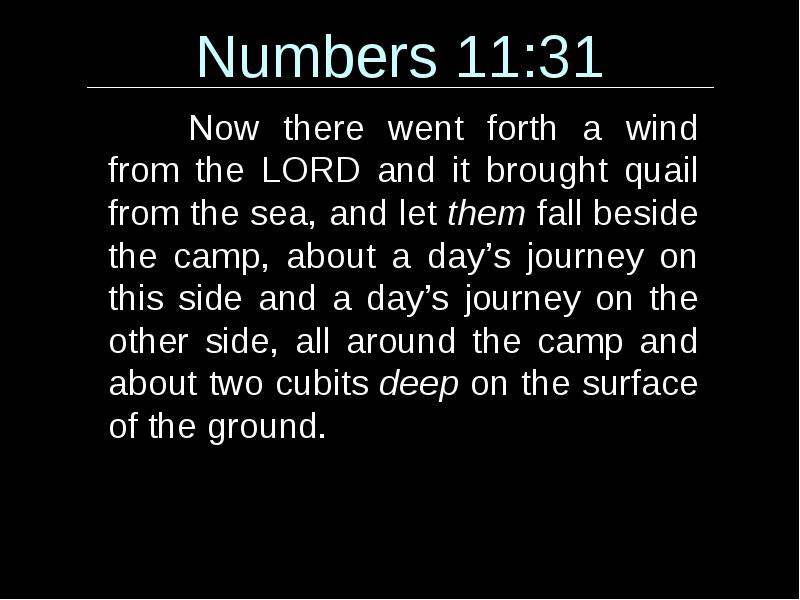
4. What are the major lessons you think Moses would hope we would remember from Numbers 12?
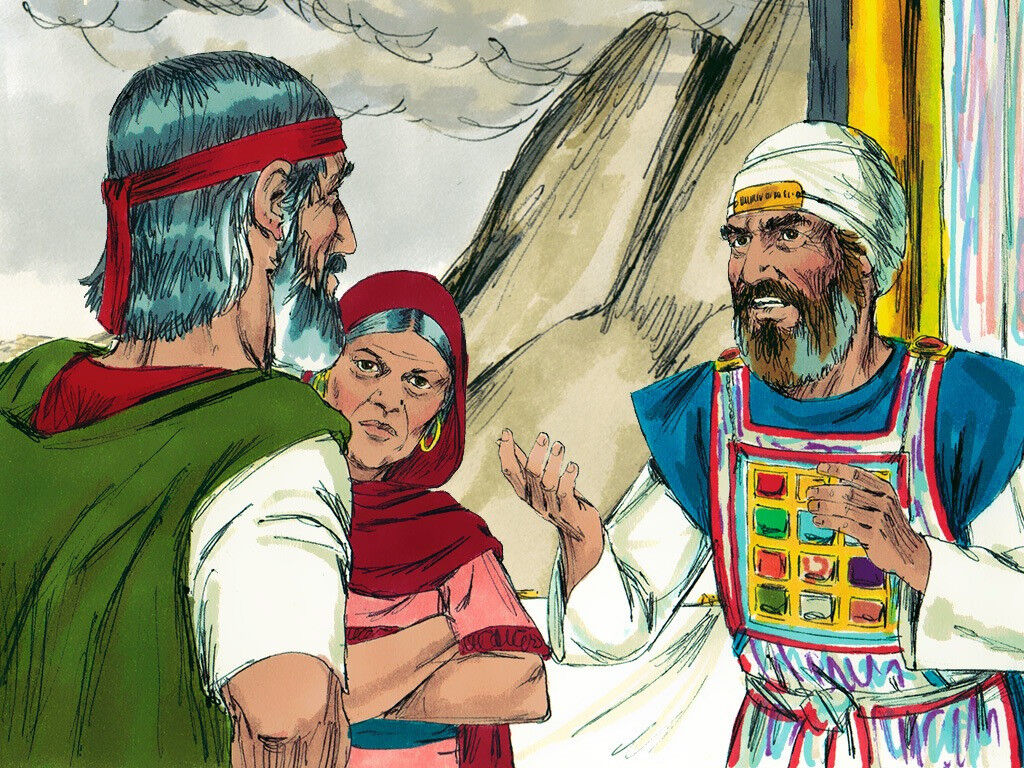
5. What right did Moses have to marry an Ethiopian woman? (12:1) Wasn’t he already married to Zipporah, Jethro’s daughter?

6. What are the major lessons of Numbers 13-14?

7. What does it mean in 14:18 that the Lord forgives iniquity and transgression but doesn’t clear the guilty? Isn’t that a contradiction in terms? How and why does he visit the iniquity of the fathers upon the children to the 3rd and 4th generation?
8. Why did the Lord first punish Israel for not wanting to go fight the Amalekites and then punish them again when they finally decided to go ahead and fight them? (Chap. 14)
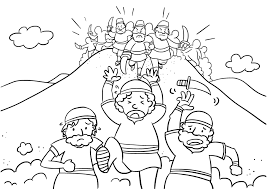
9. What precisely was so wrong with the way Moses got water for his people in chapter 20? Should that have been enough to have kept both him and Aaron out of the promised land?
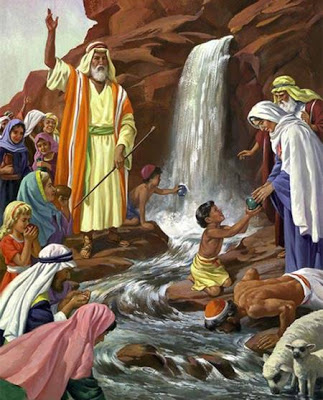
10. Was Balaam basically a good guy or a bad guy? If a bad guy, how could he get revelation from God and prophesy of the Messiah? If a good guy, why does he want to curse Israel and why does the Israelite army eventually kill him?
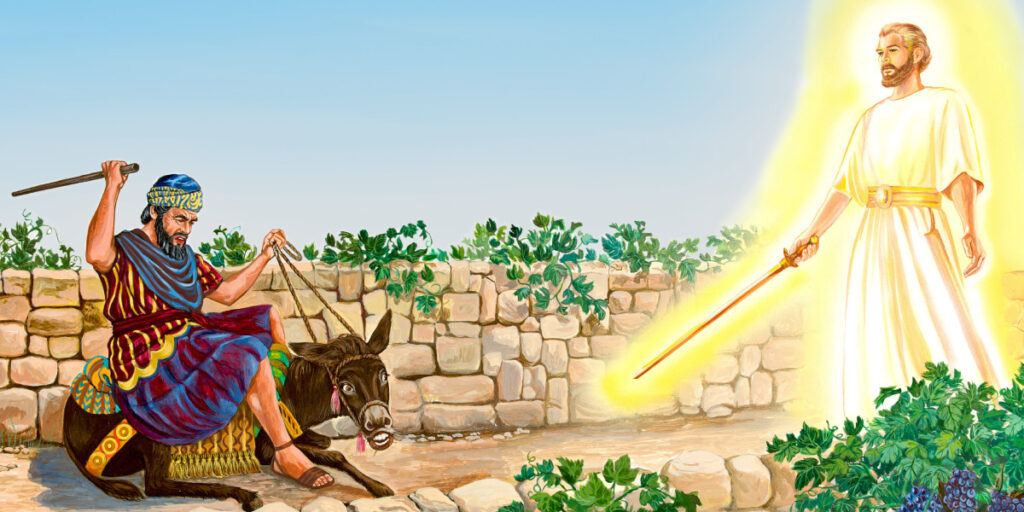
11. The Israelites’ forty years in the wilderness were characterized by constant complaining, in spite of the many miracles with which the Lord blessed them. What complaints have you heard people make against the Lord or His servants that parallel those of Moses’ day and which you feel we should be careful to avoid?
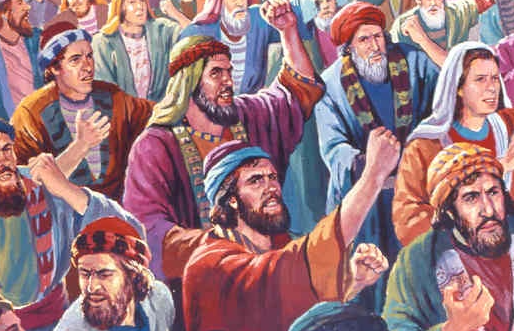
Possible Answers to Points to Ponder in Numbers 11-14, 20-24
1. What do you feel are the most important principles that are taught in Numbers 11?
Your choice. Mine would include:
- Complaining against the Lord brings disaster. (11:1; 11:4-10, 19-20, 31-33)
- We need to be careful what we pray for. Sometimes the Lord may teach us a lesson by giving us what we are asking for. (11:18-20, 31-33)
- Righteous prayer can bring miracles (11:2)
- Even prophets can become discouraged (11:10-15)
- In times of need, the Lord will provide others to help us bear our burdens. (11:16-17)
- Freedom and the blessings of the gospel are worth far more than all the world has to offer. (11:20)
- Great leaders are not jealous of the gifts and accomplishments of their associates. (11:29)
- The gift of prophecy is not limited to the President of the Church, but God would be pleased to have us all exercise it. (11:29)
2. Who was right in the expressed difference of opinion between Moses and Joshua in 11:27-29? Weren’t both men prophets? How, then, could they disagree?
Moses was right. Joshua was wrong. Having a call from God, even as a prophet, does not confer omniscience. As Joseph Smith taught, a prophet is not always a prophet, but only when acting as such. Joshua felt that somehow it undermined Moses’ authority or honor to have others enjoying the gift of prophecy. Moses rightly observed that it was the Lord’s wish that everyone might be so endowed.
3. When the people complained so much about their diet, why did the Lord send such an overabundance of quail that even those who gathered the least had some 65 bushels of them?
Presumably to dramatize just how wrong they had been to complain about their diet, which though predictable was really quite tasty and thoroughly nutritious and plentiful.
4. What are the major lessons you think Moses would hope we would remember from Numbers 12?
My list would include:
- Meekness and great leadership skills are not incompatible. (12:3)
- The Lord is displeased when we criticize His chosen servants. (12:2, 5-8)
- Though all may exercise the gift of prophecy, all still need to follow the lead of the one man the Lord has appointed as prophet over the entire congregation or church. (12:6-8)
5. What right did Moses have to marry an Ethiopian woman? (12:1) Wasn’t he already married to Zipporah, Jethro’s daughter?
Some have tried to assert that Zipporah and the Ethiopian wife were one and the same. But as the institute student manual indicates, Moses’ marriage to the Ethiopian woman evidently occurred before his marriage to Zipporah, while he was still a prince of Egypt and was leading the Egyptian armies in an attack against Ethiopia. The Jewish historian Josephus indicates her name was Tharbis, that she fell in love with Moses as she watched him lead the Egyptian armies, and that she agreed to deliver her city into his hands if he would consent to marry her. She did, and he did. The marriage was thus evidently a political move to end the war and establish peace between the two nations, a not uncommon practice in those days. Apparently she did not return to Egypt with Moses, and in any case it is quite clear that she did not accompany him when he left Egypt for Midian. But even if the marriage were still technically valid when he met Zipporah, Moses lived in a day when the Lord frequently permitted plural marriage. Aaron and Miriam evidently were not objecting to Moses’ marriage to the Ethiopian woman on grounds of his having too many wives but because of her not being of the covenant race. It was not, however, their place to criticize God’s prophet. If the Lord was displeased with Moses’ marriages, it would have been up to Him to say so, and there is nothing in the scriptures to indicate that he did.
6. What are the major lessons of Numbers 13-14?
Maybe:
- The Lord is displeased when we don’t trust in His power and promises. (14:26-29)
- There are great blessings for those willing to stand up for right even when it is not popular and potentially dangerous, as Joshua and Caleb did. (14:30)
- The day will come when “all the earth shall be filled with the glory of the Lord.” (14:21)
- The Lord’s power will not be with us when we attempt to use it contrary to His will and instructions. (14:40-45)
7. What does it mean in 14:18 that the Lord forgives iniquity and transgression but doesn’t clear the guilty? Isn’t that a contradiction in terms? How and why does he visit the iniquity of the fathers upon the children to the 3rd and 4th generation?
The Lord forgives iniquity and transgression in the case of the repentant, which renders them no longer guilty. He does not clear those who prefer to hang onto their guilt. The iniquity of fathers is visited upon their descendants by the influence of their bad examples and the traditions which are passed on to them, not because God punishes children for the sins of their fathers.
8. Why did the Lord first punish Israel for not wanting to go fight the Amalekites and then punish them again when they finally decided to go ahead and fight them? (Chap. 14)
The issue was obedience. In both cases, Israel was acting in disobedience to what the Lord had asked them to do. By the time they had finally decided to follow his first set of instructions, the Lord had changed the instructions.
9. What precisely was so wrong with the way Moses got water for his people in chapter 20? Should that have been enough to have kept both him and Aaron out of the promised land?
The Lord instructed Moses to speak to the rock. Moses instead chose to hit it twice with his rod. When water gushed out anyway, he took credit for it. Aaron was evidently complicit. While it may seem to us extreme punishment for the Lord to keep both from entering the promised land, it certainly was a powerful lesson to the entire congregation that no one is exempt from keeping the Lord’s commandments with exactness. But from the Lord’s perspective, He wasn’t punishing Moses or Aaron at all, but letting them enter into a far greater land of promise in the spirit world, where they would be free from all the pains and travails they had experienced for the preceding forty years.
10. Was Balaam basically a good guy or a bad guy? If a bad guy, how could he get revelation from God and prophesy of the Messiah? If a good guy, why does he want to curse Israel and why does the Israelite army eventually kill him?
He seems to have been a “bad guy.” He “loved the wages of unrighteousness” (2 Peter 2:15) and wanted to curse Israel for money. He evidently was behind the Moabite seduction incident in chapter 25 (Numbers 31:16.) The fact that the invading Israelites killed him (Numbers 31:8) is evidence of their opinion of his worthiness. In Revelation 2:14 we are told that Balaam “taught Balac to cast a stumblingblock before the children of Israel, to eat things sacrificed unto idols, and to commit fornication.” Receiving revelation from God does not in and of itself make a person good, nor is it always a sign of God’s pleasure. Cain is another case in point. As Paul reminded us, “Though I speak with the tongue of men and of angels, and have not charity, I am become as sounding brass, or a tinkling cymbal.”
11. The Israelites’ forty years in the wilderness were characterized by constant complaining, in spite of the many miracles with which the Lord blessed them. What complaints have you heard people make against the Lord or His servants that parallel those of Moses’ day and which you feel we should be careful to avoid?
Some unfortunate examples I have heard include:
- Complaints about the Prophet’s masking or vaccine recommendations.
- Complaints about the content of a leader’s talk at BYU or in general conference.
- Complaints about the emphasis on the use of the complete name of the Church.
- Complaints that the Lord didn’t heal someone.
- Complaints about the weather the Lord permitted to come.
- Complaints about a leader’s political views.
- Complaints about the Church’s position on homosexuality, including gay marriage.
- Etc.
We may do well to reread the Book of Numbers and review how well murmuring turned out there, or how much it helped Laman and Lemuel in the Book of Mormon.
